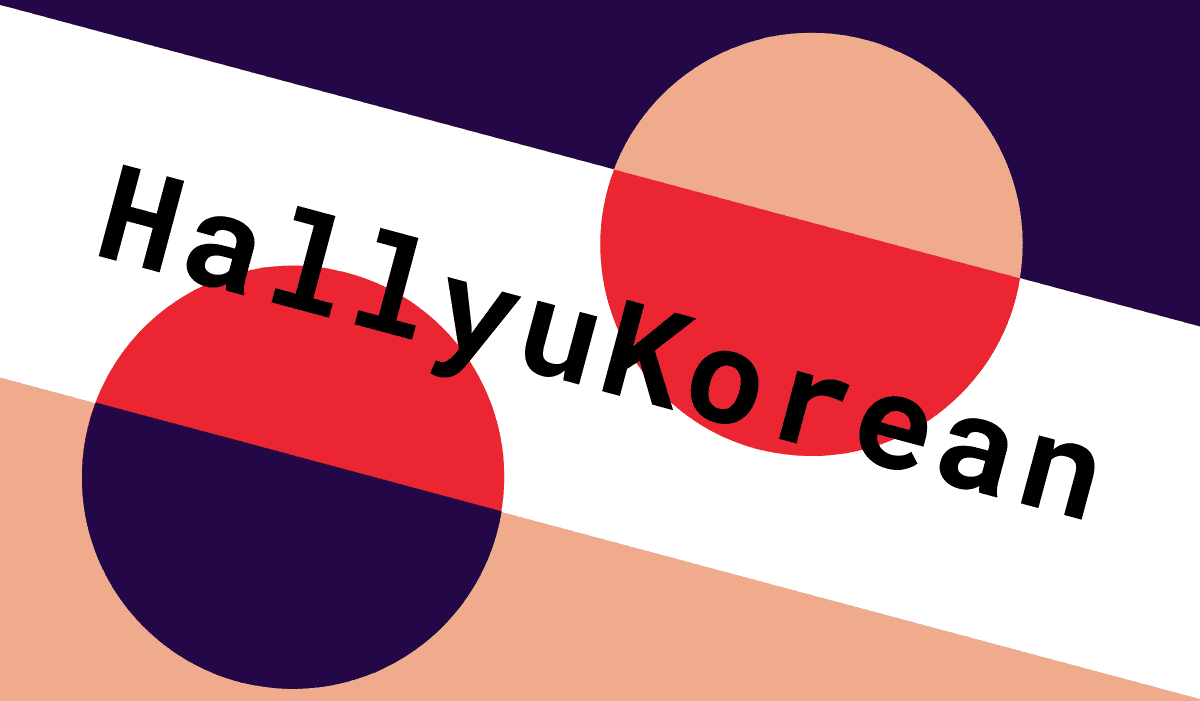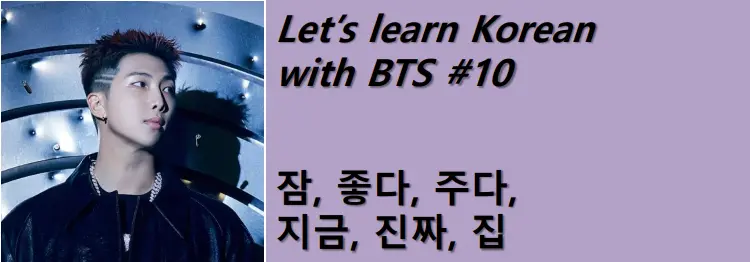Basic Korean words beginning with the consonant ㅈ([ji-eut], [j] sound)
Let’s learn Korean words 잠, 좋다, 주다, 지금, 진짜, 집 with BTS lyrics.
Click on the image below to listen to all the BTS lyrics used in this post.
잠 [jam] sleep

ⒷⓉⓈ 반쯤 감긴 눈, 잠 못 드는 밤
ban-jjeum gam-gin nun, jam mot deu-neun bam
Half-closed eyes, sleepless night
*반쯤(half) + 감긴(감기다(shut, close) + ㄴ(noun modifier)) +
눈(eye) +
잠(sleep) + 못(not) + 드는(들(다)(enter, get into) + ㄴ(noun modifier)) +
밤(night)
(*잠 is a noun and its verb form is 자다 (/jada/, to sleep).)
좋다 [jo-ta] to be good

ⒷⓉⓈ 넌 남이 되고 오히려 더 좋아 보여
neon na-mi doe-go o-hi-ryeo deo jo-a bo-yeo
You look even better after we broke up
*넌(너(you) + 는(topic particle), =넌) +
남(other) + 이(subject particle) +
되고(되다(become) + 고(and)) +
오히려(rather) + 더(more) +
좋아 보여(좋다(good) + ~아 보여(seem)
주다 [ju-da] to give

ⒷⓉⓈ 다시 기회를 줘
da-si gi-hoe-reul jwo
Give me another chance
*다시(again) +
기회(chance) + 를(object particle) +
줘(주다(give) + 어(an imperative ending suffix))
지금 [ji-geum] now

ⒷⓉⓈ 너 지금 위험해
neo ji-geum wi-heom-hae
You’re in danger right now
*너(you) +
지금(now) +
위험해(위험(danger) + 하다(to be, to do))
(*하다(hada, to do) is the dictionary form and there are several conjugations of 하다 in Korean.
1)해라(haera) 2)해(hae) 3)해요(haeyo) 4)하십시오(hasipsio)
해요, 해 are informal and are usually used in everyday conversation.
The politeness level is 1 < 2 < 3 < 4.)
진짜 [jin-jja] real, really, very
ⒷⓉⓈ 진짜 내 소원은 너뿐이야
jin-jja nae so-wo-neun neo-ppu-ni-ya
What I’m really wishing for is just you
*진짜(really) +
내(나(I)+의(of) = 내) +
소원(wish) + 은(topic particle) +
너뿐이야(너(you) + 뿐(only) + 이야(be, =이다))
집 [jip] house

ⒷⓉⓈ 좋은 집 좋은 차 그런 게 행복일 수 있을까?
jo-eun jip jo-eun cha geu-reon ge haeng-bo-gil su i-sseul-kka?
A good house, a good car, will those things bring happiness?
*좋은(good) + 집(house) +
좋은(good) + 차(car) +
그런(such) + 게(것(thing) + 이(subject particle), =게) +
행복일 수 있을까(행복(happiness) + 이다(to be) + ~ㄹ 수 (수, dependent nouns) + 있을까(is it possible?)
(*것 is the most common dependent noun in Korean and means thing.
거 is shortened form of 것 and 게 is a shortened form of 것이(것+이(subject marker)).
건 is a shortened form of 것은(것+은(topic marker)) and 걸 is a shortened form of 것을(것+을(object marker)).
‘Verb stem + ~ㄹ 수 있다’ means ‘can’ and ‘Verb stem + ~ㄹ 수 없다’ means ‘can’t’.
~ㄹ/을까 can have a variety of meanings depending on the context and can be used to ask a question, express an intention or worry.)
Grammar Reference
*Verb stem + ~고 : verb + and, and then, after
ex)되고 : 되다(become) + ~고(and)
‘그리고’ can be abbreviated as ‘verb stem + ~고’. It can be translated as ‘and’, ‘and then’ or ‘after’.
*Noun+하다 : verb
Many Korean nouns that indicate or describe an action or behavior can be combined with 하다 to form verbs.
In some cases, nouns can be turned into verbs by simply adding the verb 하다 (to do).
ex)위험(danger) + 하다 = 위험하다 (to be in danger)
*Noun + ~이/가 : noun + subject particle
ex)남이 : 남(other) + 이(subject particle)
이 for nouns ending in a consonant, 가 for nouns ending in a vowel.
*Noun + ~은/는 : noun + topic particle
ex)넌 : 너(you) + 는(topic particle)
소원은 : 소원(wish) + 은(topic particle)
은 for nouns ending in a consonant, 는 for nouns ending in a vowel.
*Noun + ~을/를 : noun + object particle
ex)기회를 : 기회(chance) + 를(object particle)
을 for nouns ending in a consonant, 를 for nouns ending in a vowel.
*Verb stem + 아/어/여라(an imperative ending suffix)
ex)줘 : 주다(give) + 어(an imperative ending suffix)
The imperative form is used when you want to make a request or command.
아/어/여라 is an imperative ending suffix.
Quiz. Linking words to images

BTS music video to enjoy
Well done for making it this far.
Watch the Danger music video above and see if you can hear “너 지금 위험해”, which you learned today.




